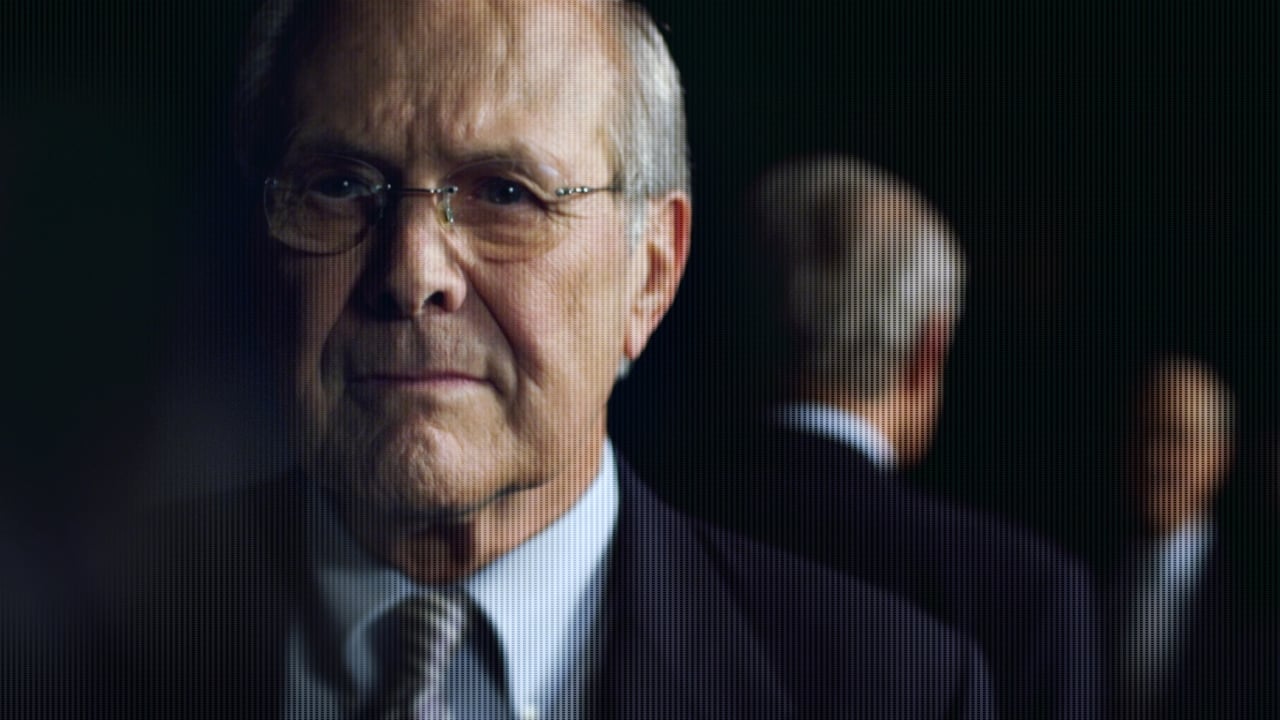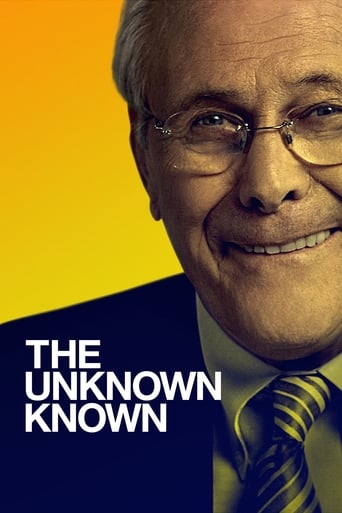



Yawn. Poorly Filmed Snooze Fest.
This is How Movies Should Be Made
A lot of fun.
A film with more than the usual spoiler issues. Talking about it in any detail feels akin to handing you a gift-wrapped present and saying, "I hope you like it -- It's a thriller about a diabolical secret experiment."
View MoreErrol Morris tackles another former United States Secretary of Defense in Donald Rumsfeld with an in-depth interview. It starts mainly on the invasion of Iraq but covers his entire Washington career and his personal life. The Iraq stuff is not anything new especially if one had paid attention. Rumsfeld is as evasive as ever. His earlier work for previous Presidents holds some interest inside stories. The obvious comparison is Errol Morris' masterpiece "The Fog of War". In that one, Robert McNamara is much less a politician and more of a wise elder lamenting mistakes. That is a much more compelling watch. This one is an extended Sunday morning political talk show and a simple biodoc of Rumsfeld's career. Errol Morris' views are obvious from his questioning. The history is informative but nothing shocking. Maybe in another twenty years, Rumsfeld will have something more interesting and surprising to say.
View MoreEither Errol Morris underestimated Donald Rumsfeld or he was overly confident about the power of his medium, but the result is far below The Fog of War.Sure McNamara had had time to mellow and he wouldn't deny mistakes while Rumsfeld won't move an inch, except for the staged emotional bit, so in the Unknown Known we only have politics at its worst: unabashed dissimulation, total rejection of any form of empathy (while it was one of the Eleven Lessons from Robert S. McNamara, Empathize with your Enemy) all wrapped up in the flag and under the pretence that "We, the Best Breed of Politicians, have to make important decisions that are way too complex for you, Little Man, to begin to understand".Watching Rumsfeld having it his way, no less than during his own press conferences where he toyed around with journalists, is a profoundly disgusting and distressing vision. He unflinchingly tell us "Ok, eventually there were no Weapons of Mass Destruction in Irak, intelligence was flawed, but going after Saddam Hussein has made the world a better place all the same". Intelligence was not just flawed, it was distorted and even fabricated to please the warmongers.Bad things (like torture) just happens. Even when you are doing a heck of a job. That is Rumsfeld definitive argument and Errol Morris gets stuck in the "beauty of evil rhetorics" like a deer in the headlights. It is distressing to think that someone watching this without knowing all the subtext would think of Rumsfeld as a role model for Statesmen. The only redeeming part is that the documentary succeeds in suggesting how big a SOB Rumsfeld has been during his career, so much so that Reagan picked his rival George HW Bush as his running mate, sparing the World the disaster of having Rumsfeld President in the 80s. Then he had to work for Bush Jr and his former deputy, yet maybe that gave the same general disaster (geopolitical, economical...) as having Rumsfeld officially in the Oval Office.
View MoreThere's something maddeningly chaotic about Donald Rumsfeld's logic in terms of US international policy. When he was in press conferences during the Iraq War under W Bush, Rumsfeld's answers to tough questions often rang of the so-called "double-speak", a term which is associated with but not explicitly used in George Orwell's "1984". He would respond with other questions or make unfunny jokes. He would use strange metaphors. Rarely did he simply answer direct questions. Errol Morris' documentary about Rumsfeld is strangely similar. He has Rumsfeld do most of the talking, and what comes out of the former Defense Secretary's mouth is a barrage of inconsistencies, untruths, and illogical conclusions. In short, Rumsfeld's whole way of thinking is a jumbled incomprehensible mess. And yet, he was one of the most powerful people in the W Bush administration during the first decade of the 21st century. You could argue W Bush had flawed judgment, Dick Cheney was immoral, but Rumsfeld is in his own realm. As Morris said in an interview, he was one of the most "self-deceiving" people he had ever interviewed.The format of the documentary is one of the strangest you'll ever see in a film of this type. The subject himself is the narrator. He narrates and then comments on the different subjects covered in the documentary. He occasionally answers questions posed by Errol Morris who can be heard in the background. One of the former Defense Secretary's most interesting phrases is "the absence of evidence is not evidence of absence", a phrase coined by Carl Sagan when referring to the unknown realms of outer space. Rumsfeld is famous for composing 1000's of email memos, and recurring throughout the memos are his definitions of particular words and terms which are displayed on-screen. The film traces his childhood, his early years in politics under President Nixon and briefly under Gerald Ford. He was an adviser for Governor Reagan and later for President Reagan and George Bush Senior. Most of the documentary concerns the Iraq War and his tenure as Defense Secretary under George W Bush.One example which highlights Rumsfeld own self-deception and denial is when Morris asks about the public perception concerning Saddam Hussein after the 9/11 attacks. Rumsfeld in the documentary claims people knew that Hussein and Iraq had nothing to do with 9/11. The documentary then cuts to a Rumsfeld press conference clip of 2003 in which a reporter quotes Saddam Hussein: "I would like to tell you directly we have no relationship with Al Queada." Rumsfeld's reply: "And Abraham Lincoln was short." The reporter than asks Rumsfeld to respond to Hussein's statement and the Secretary of Defense simply says that Hussein "rarely tells the truth". The implication is clear: Rumsfeld wants the public to believe that Hussein and Iraq contributed to 9/11. If you read between the lines, and realize what is unsaid rather than said, Rumsfeld never actually states that Hussein is lying about having a relationship with Al-Queada. He makes the Lincoln analogy joke and he says that Hussein has a pattern of lying, but never once did Rumsfeld himself directly accuse Hussein of lying about having a relationship Al-Quaeda. This is the kind of double-talk, doublespeak which is how Rumsfeld's reasoning seems to work.People have criticized the documentary as raising many more questions than it answers. This may be the point of the film. Rumsfeld comes off, at best, as a completely self-deceived person whose rationalities have no logic, and at worst an amoral international leader who got us into an unjust war. His logic, we "lacked imagination" to see the Japanese coming when they attacked Pearl Harbor and thereby justifies the War in Iraq. As Morris points out in an interview, if we can imagine our enemies doing anything in the future, then we can rationalize military operations for almost any reason at any time.
View MoreMany reviews of this film decry the lack of any new revelations of note. Many commentators argue that Donald Rumsfeld is evasive and too smart for Errol Morris.On the contrary I believe this is actually a better film, more revealing than "Fog of War". How, you may ask?Simply this, McNamara was emotional and outspoken. He captivated the audience. Rumsfeld was "cold and measured". This is just as thrilling. If you look very closely, there are subtle clues in his evasiveness, even if to illuminate his extreme arrogance as a veil for something hidden beneath.What that something is, we can only speculate on, but that is part of the film's appeal. We can learn more from the unknown knowns than what is clearly spelled out.
View More